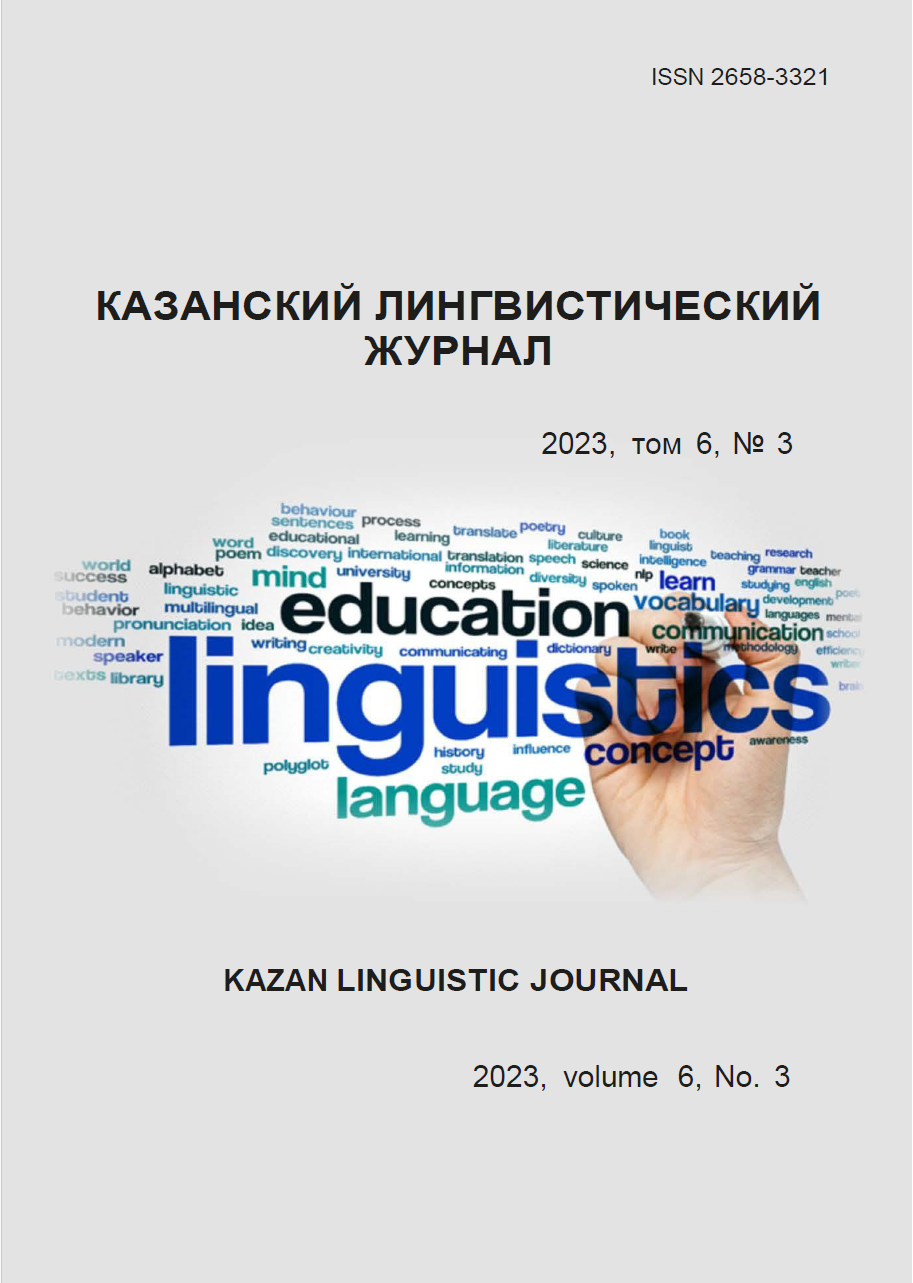Argumentative potential of hedges: communication success and “Strategic stereotypes” during the presentation of new scientific content in articles on eco-nomics written in different languages
https://doi.org/10.26907/2658-3321.2023.6.3.421–430
Keywords:
hedge, hedging, scientific article on economics, scientific discourse, argumentative potential, pragmalinguisticsAbstract
The article is devoted to the use of hedges and hedging constructions in scientific articles on economics written in English, Turkish and French. The purpose of the study is to determine the features of the use of hedging markers in multilingual scientific articles on economic topics in terms of their argumentative component during the presentation of new scientific content by the author. Particular attention is paid to the pragmatic component of hedging within the framework of scientific discourse during the analysis of what communicative effect hedges and hedging constructions produce on the addressee, what is their functional specificity in different sections of scientific articles, how the author achieves his goals through the use of them. Analysis of hedging is carried out taking into account the norms and requirements for scientific articles, the communicative component and the process of establishing an implicit dialogue between the author of the article and a potential addressee, the pragmatic potential of hedges within the framework of the argumentation process and the author's hypothetical judgments. In addition, various aspects of the modality of hedges and hedging constructions and their semantics are illustrated, as well as the role of the use of subjective-evaluative and emphasizing formulas, belonging to the category of hedging, in scientific articles on economics.
References
References
Milostivaya A.I., Svetaylov B.V. Linguistic features of an English-language Scientific Ar-ticle on Economics. Aktual'nye problemy filologii i pedagogicheskoi lingvistiki. 2019;4:133‒139. DOI: 10.29025/2079–6021-2019-4-133-139. (In Russ)
Sergeeva Yu.S. Constitutive features of academic discourse: digital transformation. Kazan linguistic journal. 2020;4(3):361–372. DOI: 10.26907/2658-3321.2020.3.4.361-372. (In Russ)
Milostivaya A.I. Pragmalinguistic understanding of communicative act in epistemological context of the 20th–21st centuries. Vestnik Stavropol'skogo gosudarstvennogo universiteta. 2009;1:52‒58. (In Russ.)
Sigacheva N.A., Marsheva T.V. Problems of translation of English scientific texts in the sphere of geodesy. Kazan linguistic journal. 2019;4(4);143‒153.
Solnyshkina M.I., Martynova E.V., Andreeva M.I. Propositional modeling as a tool to assess text information complexity. Uchenye zapiski natsional'nogo obshchestva prikladnoi lingvistiki. 2020;3(31):47‒57. (In Russ.)
Bobyreva N.N. Lexical markers of the scientific sport discourse (based on “Science of gymnastics journal”). Kazan linguistic journal. 2021;3(4);366‒379. DOI: https://doi.org/10.26907/2658-3321.2021.4.3.366-379. (In Russ.)
Sakaeva L.R., Takhtarova S.S., Bazarova L.V., Yahin M.A. Logical and conceptual classi-fication of English, Russian and Turkish medical terminology. Kazan linguistic journal. 2022;5(3);360‒368. DOI: https://doi.org/10.26907/2658-3321.2022.5.3.360-368. (In Russ.)
Kristic A. Hedging in Academic Writing: A Contrastive Analysis of Scientific Articles and Student Papers. Zagreb: University of Zagreb; 2018. 32 p.
Brooks A.C. How Did the Great Recession Affect Charitable Giving? Public Finance Re-view. 2018;46(5):715‒742. DOI: 10.1177/1091142117691604.
Eromiants I.S., Zhdanova E.V., Marinenko L.A. The Peculiarities of Hedging Language in Academic Writing. Idei. Poiski. Resheniya: sbornik statei i tezisov XII Mezhdunarodnoi nauchno-prakticheskoi konferentsii (Minsk, October 26, 2018). Minsk: izdatel'stvo BGU. 2018;2:5‒8.
Avenel É., Caprice S. Collusion and downstream entry in a vertically integrated industry. Revue économique. 2018;1(69):5‒28. DOI 10.3917/reco.pr2.0110. (In French)
Lunsford K.G., Kenneth D.W. Some Evidence on Secular Drivers of US Safe Real Rates. American Economic Journal: Macroeconomics. 2019;11(4):113–139. DOI: https://doi.org/10.1257/mac.20180005.
İmamoğlu I.K. Foreign direct capital investments and export relationship: ARDL bound testing approach for the Turkish economy. International Journal of Economics, Business and Poli-tics. 2022;6(1):79‒96. DOI: https://doi.org/10.29216/ueip.1079243. (In Turkish)
Sobel R. Critique of capitalism and wage dispute: Lyotard Kantian Reader of Marx. OEconomia. 2017;9‒4:655‒688. DOI: https://doi.org/10.4000/oeconomia.6919. (In French).
Kuduz N., Atasever M. Entrepreneurship characteristics of financial enterprises accord-ing to the mission and vision expression components in the context of strategic management. İzmir Journal of Economics. 2022;37(1):53‒76. DOI: 10.24988/ije.793444. (In Turkish.)
Fomina M.A. The addresser's markers in academic dialogue. Lingvokul'turnoe obra-zovanie v sisteme vuzovskoi podgotovki spetsialista. 2017;(10):96‒103. (In Russ.)






